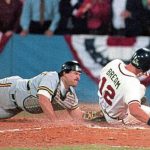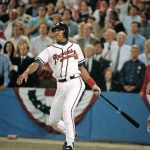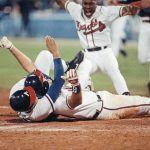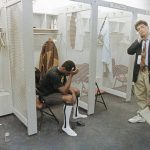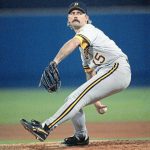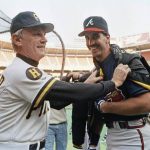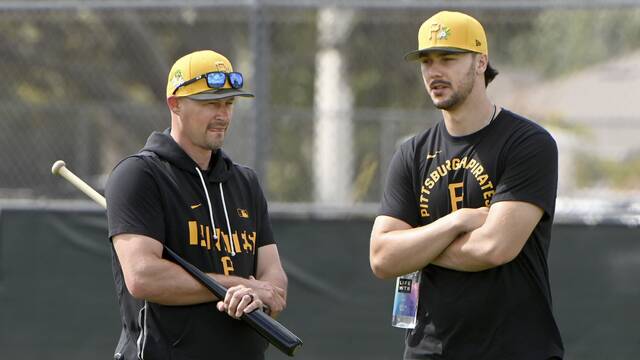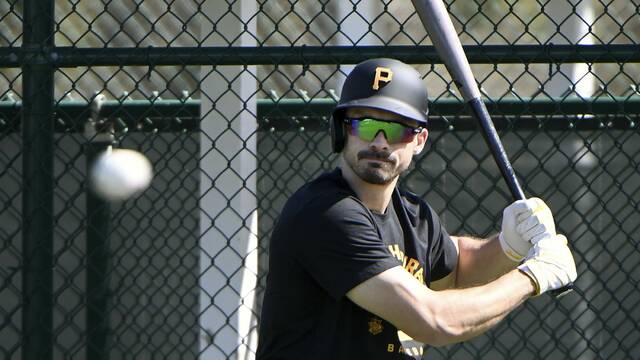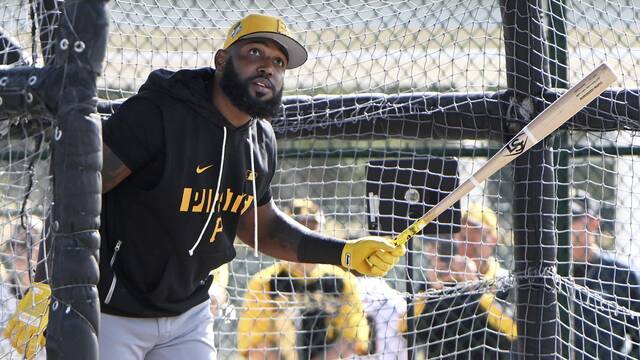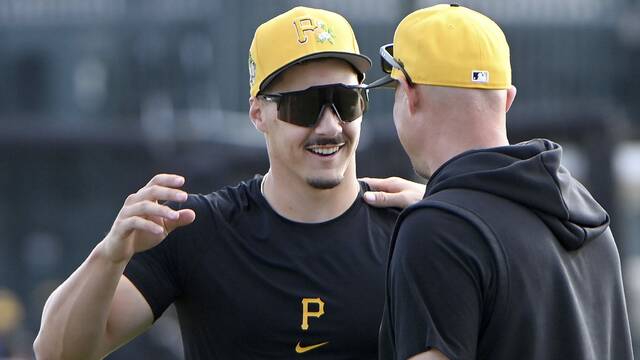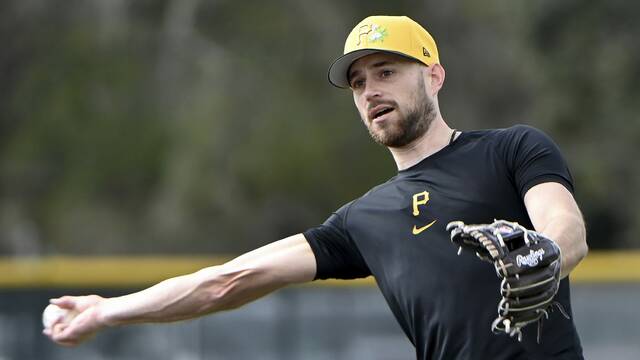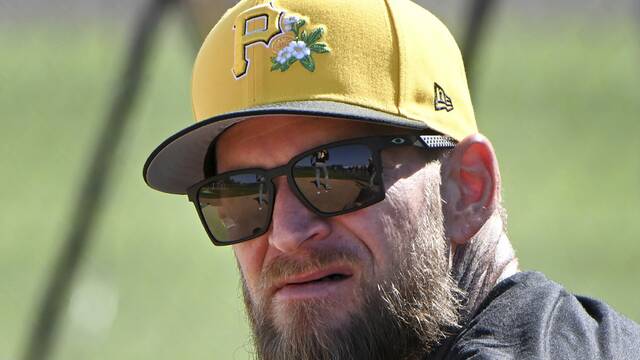Don Kelly wears the uniform of the team he passionately supported as a child.
The Mt. Lebanon High School product played for the Pittsburgh Pirates in 2007 and is now the bench coach on manager Derek Shelton’s staff.
As a minor leaguer for the Detroit Tigers, Kelly made the acquaintance of a coach he remembered seeing on TV as a player for the Atlanta Braves in the early 1990s.
Francisco Cabrera.
The same Francisco Cabrera who ended a stretch of winning baseball in Pittsburgh that remained dormant for the ensuing two decades — and for most of the past 30 years.
“I let him know he ruined my childhood,” Kelly said. “Joking. But … kinda not.”
It was Cabrera’s game-
For the then-12-year-old Kelly and a generation of Pirates fans, it was a sudden curtain-drop on competitive baseball.
The NLCS win sent the Braves to the 1992 World Series and the Pirates into ignominy. Since then, the Braves have won 18 more division titles, including one this year. The Pirates have won none.
The Braves have had 20 playoff appearances. The Pirates have had three. The Braves have finished above .500 24 times. The Pirates have done so four times.
The Braves have two World Series titles and have been to the Fall Classic four times since 1992. The Pirates have not been in a World Series since winning it all in 1979.
The Pirates’ loss to Atlanta on Cabrera’s hit is the most singularly defining play to shift the direction of a franchise in MLB history.
The Boston Red Sox have won four World Series crowns since Bill Buckner’s error. The Chicago Cubs were in the playoffs three years after Steve Bartman attempted to catch a foul ball from the stands and have since won a World Series. The Cleveland Indians/Guardians are enjoying a 10th playoff berth (including a World Series appearance) since Edgar Renteria’s championship-clinching hit for the Florida Marlins in Game 7 of the 1997 World Series.
Meanwhile, since Cabrera and Bream, the Pirates have had 26 losing seasons in 30 tries and have yet to win another pennant.
Friday marks the 30th anniversary of that course-altering night in Atlanta.
Set up to slide
The story — and the pain — of the 1992 NLCS can’t be told without appreciating the history and irony of how the Pirates and Braves got there.
After an 11-year playoff drought, the Pirates lost the 1990 NLCS to the Cincinnati Reds and the 1991 series to the Braves. Pittsburgh was favored to win the 1991 NLCS against the surprising “worst-to-first” Braves. But the Pirates blew a 3-2 series lead, failing to score a run in the last two games at Three Rivers Stadium.
Between ’91 and ’92, All-Star slugger Bobby Bonilla left via free agency to join the New York Mets. John Smiley was traded to the Minnesota Twins. Barry Bonds was destined to bolt via free agency after ’92 ended, and ace starter Doug Drabek was likely leaving too.
“Our clubhouse was (ticked) when ‘Smiles’ got traded. It was not a happy bunch of guys,” pitcher Bob Walk said. “That was like somebody put a shot over our bow. It was like, ‘They think Bonilla is gone, so now we can’t win?’ Maybe at that point, that’s when that team got a little bit closer.”
While some baseball observers expected the Pirates would drop back in ’92, they won the National League East again with 96 wins, just two shy of their ’91 total.
“We just had the best atmosphere,” manager Jim Leyland told the Tribune-Review recently. “We had everybody pulling for everybody. It was a very close-knit team. A special bunch of guys.”
In the 1992 rematch, the Pirates were the underdogs after the Braves followed up a World Series berth in ’91 with a 98-win season in ’92. The Pirates were down 3-1 in the series before Bob Walk and Tim Wakefield spun back-to-back gems and the Pirates bats exploded en route to 7-1 and 13-4 victories in Games 5 and 6, respectively.
“We had better talent in 1991. But we were a better team in 1992,” centerfielder Andy Van Slyke said. “We were more mature. We knew what to expect. I was more nervous being up against the Braves (in 1991) than being down 3-1 in 1992. We knew we were going to get to a Game 7.”
In that deciding game, Drabek — the 1990 Cy Young winner — took the mound against John Smoltz, who had beaten him in Game 1 and Game 4. Many thought it might be Drabek’s last game as a Pirate with free agency looming.
“A lot of guys knew that (dismantling the team) was a big possibility,” Drabek said. “It had been talked about a lot. But the coaches did a good job keeping that out of what guys were talking about. But in the back of everybody’s mind, they knew it was a possibility.”
Drabek danced around potential landmines all night, scattering six hits and two walks through eight innings. That included Jeff Blauser lining into a double play with no one out and the bases loaded in the sixth inning, followed by a Terry Pendleton lineout to close the inning. At that point, the Pirates held a 2-0 lead, courtesy of RBIs from an Orlando Merced sacrifice fly in the first inning and a Van Slyke single in the sixth.
Despite leaving nine men on base and going 1 for 7 with runners in scoring position, the Pirates would hold that two-run advantage through the middle of the ninth.
“In the seventh inning, eighth inning, I was thinking, ‘Wow, we are going to lose this game.’ We don’t have a chance because Drabek was throwing very good. He was untouchable,” Cabrera said.
Enough had gone right for the Pirates heading into the final frame that you could envision the star-crossed team finally closing out an NLCS. Yet not enough had gone right that you could actually feel comfortable about it.
The ‘top priority’
That was the history. Bream provided the irony, just so the tragedy had a little extra bite.
The first baseman joined the Pirates from the Los Angeles Dodgers as part of a trade for Bill Madlock in September 1985 — a 104-loss season in Pittsburgh.
Bream was a steady-hitting, smart, solid-fielding player through the 1990 NLCS loss. He hit .267 with 57 home runs and 293 RBIs over six seasons in Pittsburgh.
But he endured multiple knee surgeries and, despite Pirates management telling Bream he was their “top priority” to sign after 1990, the front office barely made him a competitive offer. So Bream left for Atlanta prior to the 1991 season.
“They didn’t do anything to keep me here,” Bream said. “They didn’t even give me the market price. Even with that, I was going to stay for a no-trade clause. They didn’t even give me a no-trade clause. So they forced me to go to Atlanta.”
During the ’91 regular season, Bream hit his first-ever grand slam — against the Pirates’ Bob Patterson. Instead of jubilation, Bream said “it felt like my grandmother had died” because the homer came against his old club.
“I love the players I played with. I enjoyed the Atlanta Braves. But I was in the foxhole with (the Pirates),” Bream said. “When we beat them in the 1991 playoffs, not that I wasn’t excited for the Braves, but there were some feelings of ‘good grief, are the Pirates ever going to have another chance to get to the World Series?’”
Bream went 3 for 10 with a homer in the 1991 NLCS. He went 6 for 22 with a homer, three walks and three doubles, while scoring five times, against the Pirates in 1992.
The fifth time he scored was the final run of the series.
A matter of perspective
I often wonder if Atlanta fans have any recollection of that ninth inning to the degree that Pirates fans do.
It’s like remembering The Immaculate Reception here compared to the perception in Oakland. Out there, to this day, Raiders fans obsess over whether Terry Bradshaw’s pass hit Jack Tatum or Frenchy Fuqua first. Did the ball hit the turf? Was there ever an official signal on the field? What were the officials being told on that telephone?
In Pittsburgh, Bradshaw threw the ball. It got deflected. Franco Harris caught it and scored. The Steelers eventually won four Super Bowls in the 1970s. End of story.
In Atlanta, do they care — or even remember — why Cecil Espy was in the game in right field or the route he took on Pendleton’s lead-off double? Or that Gold Glove winner Jose Lind had only six errors in 1992 before booting David Justice’s routine grounder at second base?
Do they remember umpire Randy Marsh and his small strike zone replacing an ailing John McSherry behind home plate? How about his borderline ball-strike calls that went in favor of Atlanta’s Damon Berryhill and against reliever Stan Belinda? Or that Van Slyke says he suggested Bonds move in before Cabrera’s hit and Bonds allegedly ignored him?
If so, was Bonds actually too deep? Or as Pirates broadcaster and former infielder John Wehner has said, maybe too close to the foul line?
Probably not. Braves fans probably simply remember Cabrera getting the hit and Bream sliding across home plate. Other details be damned.
If you were a Pirates fan of Kelly’s age or older who lived through — and died a little during — that game, you can recite those moments by rote. You don’t even need the line score.
By the time Cabrera came to bat, the Braves had pulled within 2-1 on Ron Gant’s near grand slam that turned into a sacrifice fly. Belinda, who saved 18 of 24 opportunities during the regular season, was on for Drabek.
Thanks to Marsh’s postage stamp-sized strike zone, Belinda walked Berryhill to reload the bases following Gant’s fly ball. That moved Bream — and his surgically repaired knees — to second base. He had walked on four pitches to end Drabek’s night two batters earlier.
Pinch-hitter Brian Hunter flared a ball behind second base to Lind for the second out, leaving Cabrera to pinch hit for pitcher Jeff Reardon. The backup catcher/first baseman had only 10 MLB at-bats under his belt during the regular season and one in the series.
From the archive: More on Bream’s slide:
• 4.7.2020: The day Pirates catcher Mike LaValliere finally cussed out the 1992 Game 7 umpire
• 12.9.2017: Tim Benz: Sid Bream pulls a Michael Keaton at PiratesFest
• 5.25.2012: Braves to honor Bream’s moment
• 10.14.2007: Bummer of ’92: Bream’s slide lives in infamy
Cabrera had some good plate appearances against the Pirates in the past. His career batting average would end up being just .254 with 17 home runs. But he homered against Neal Heaton and Smiley in 1990. He even homered off Belinda during the 1991 regular season.
“I hit against Belinda, and I had success against him,” Cabrera said. “So I was very, very secure. I was sure I was going to do a good job against him. I was without pressure.”
After taking two pitches out of the strike zone, Cabrera pounced on Belinda’s third pitch and ripped it foul.
At that point I recall believing for the first time that the Pirates were actually going to win. I remember thinking, “That’s it! That was his best swing. He’s not getting a better hack than that.”
Cabrera admitted to me that he felt the same thing.
“That’s what I was thinking,” Cabrera chuckled. “I was thinking negative for a minute. But then I said, ‘Wait a minute, no way! I still have a chance. I’m on top, two balls and one strike. He’s going to come back, and I’m going to get a hit.’”
If only we were both right the first time.
When Sid slid
CBS play-by-play man Sean McDonough belted out the call of the next pitch.
“Now the 2-1. Line drive and a base hit! Justice will score the tying run. Bream to the plate. And he is … safe! Safe at the plate! And the Braves go to the World Series!”
What McDonough didn’t say was, “… and the Pirates’ dreams are dashed for the next quarter-century.”
He didn’t have to. Everyone knew.
Van Slyke knew. That’s why he sat motionless in the outfield grass for what felt like a half-hour.
“It wasn’t just disappointing for me or for the team. I knew Pirates fans were going to suffer for a long time,” Van Slyke said. “The writing was on the wall. … We all knew what was coming.”
Pitching coach Ray Miller knew. That’s why he was blankly staring at home plate where 50 members of the Braves celebrated. Miller was absently gazing as if waiting for Belinda’s next pitch that was never going to come.
Bonds knew. That’s why, having just earned a third Gold Glove, he was bewildered on one knee in left field, wondering how his throw couldn’t have beaten Bream at home plate.
“(Bonds) really made a terrific play,” Van Slyke said. “It’s just unfortunate it sailed a little bit up towards the first base line. If he makes a more accurate throw, we go to extra innings and who knows what happens.”
Knowing he had at least tied the game with his single between shortstop Jay Bell and third baseman Jeff King, Cabrera remembers his reaction to seeing the slow-footed Bream head home instead of stopping at third base.
“Nooooo,” Cabrera exclaimed with a belly laugh on the other end of the phone. “I was never thinking he was going to score.”
Despite five knee surgeries, despite the ball not being very deep in left field, despite Bonds’ reputation for having an accurate, if not overly powerful, throwing arm, Bream said he never had a doubt that he was going to try to score. He said he never even noticed a signal from third base coach Jimy Williams.
“I never saw Jimy whether he was waving me or holding me,” Bream said. “I took off. If he really, truly would have stopped me, he would’ve had to be right in front of my face. I presume he was rounding me. But I don’t know that to this day.”
On the replay, you can catch a glimpse of Williams waving home Bream. Van Slyke said it was the right move even if Bream wasn’t fast.
“Sid Bream really was a good base runner. Not the fastest guy. The way he cut the bases, he really did a fantastic job of running the bases correctly to give himself a chance to score,” Van Slyke said.
Bream — who once stole 13 bases for the Pirates in 1986 — said that before his knee surgeries he always took pride in his base running
“I loved to be aggressive on the base paths. I loved to go first to third. I loved to do the right stuff on (the bases),” Bream said.
But he knows “The Slide” never happens without “The Swing” from Cabrera.
“To hit the ball that he hit and hit a line drive between third base and shortstop, with a side-armer like Stan Belinda throwing, was an amazing feat,” Bream said. “He was able to reach out and pull a line drive through the hole. If I had done that, it would’ve been a groundball double play. It was a spectacular swing and a spectacular at-bat.”
‘Spanky, I was safe’
Van Slyke has no problem rationalizing the call at home plate, even if some Pirates fans can’t get over it 30 years later.
“It was close. But he was clearly safe,” Van Slyke said. “I’m not particularly sold on the fact he actually touched the plate. … (But) I think home plate is totally different because you have nothing to slide into. I get it on the bases. But home plate? I think if you break that perpendicular plane, I think you should be safe.”
For as much as it hurt at the time, Van Slyke goes so far as to embrace being part of a play like that. Because, as he points out, with instant replay involved in baseball now, we’ll never see an exclamation point ending like that again.
“His foot was an inch above home plate. Are we going to decide this game based on a replay? And that’s why I hate replay. I can live with the fact the call was made, right or wrong. I can definitely live with that,” Van Slyke said.
Catcher Mike “Spanky” LaValliere has had a harder time letting it go. Bream said on occasion he’ll be asked to sign a photo of that play at home plate, that LaValliere has already autographed and that LaValliere usually adds “He was out” after he signs it.
“So I sign, ‘Spanky, I was safe,’” Bream retorted.
Does Bream’s foot pop up slightly over the plate (and not on it) as he hits the dirt and is tagged by LaValliere? Yes.
Before instant replay review, is any umpire going to make that call when the runner had beaten the throw by that much, even if he could make that microscopic determination in a split second? No.
Bream disregards that minutia anyway.
“My heel hit the corner of home plate before my foot popped up. I have no doubt in my mind I was safe. And to the naysayers, I couldn’t care less,” Bream said.
Bream still lives in Zelienople. That’d be like if Bucky Dent had purchased a condo in Back Bay near Fenway Park or if Max Talbot had retired to a second home in Detroit.
Being a Pirate had meant that much to Bream. His third son, Austin, has the middle name “Leyland.” Yet Bream admits when Pittsburghers recognize him, it’s often not as a former Pirate but as the guy who slid across home plate in 1992.
“But they often bring this caveat: ‘We’re glad it was you,’” Bream said.
‘Nobody is going to remember me anyway’
“The week is gone. The month is gone. The year is gone. And you don’t do what you need to do,” Cabrera said of the 30 years since his hit. “The time … it flies.”
After his NLCS game-winner, Cabrera got only one at-bat in the World Series. It was a lineout to left field during the Toronto Blue Jays’ Game 6 series-clinching win.
He got 20 hits in 70 MLB at-bats the next season, then spent the rest of his career bouncing between the minor leagues, Japan, China, Mexico and independent leagues in the U.S. and Canada.
Cabrera is now living in the Dominican Republic. He is in Santo Domingo, the town where he was born. He still is involved in baseball and wants to get back into the game professionally next year.
This past summer, he was managing a Mexican League-affiliated franchise in Colorado Springs, Colo. called the Rocky Mountain Vibes. It was a team that, in June, lost back-to-back games by scores of 24-17 and 31-5.
“We didn’t have many pitchers,” Cabrera said.
Where are Smoltz, Tom Glavine and Steve Avery when you need them, Francisco?
Interactions like the one he had with Kelly aren’t entirely uncommon. Pittsburghers will recognize him and can’t wait to tell him how much he damaged their lives.
“Fans get close to me and say, ‘I lost a lot of money because of that guy right here,’ and I think they want to kill me,” Cabrera laughed. “The fans, when their team loses, they feel bad. They are going to cheer some people. They are going to boo some players. As a player, I understand.”
Cabrera insists he always liked playing in Pittsburgh and would’ve enjoyed being a Pirate. His father was a big Roberto Clemente fan.
“I feel really good that I got the hit. But I’m sorry for them,” Cabrera said of Pirates fans. “You want to do a good job. You have to do what you have to do. It’s nothing against the Pirates. I like that team, the fans. But that was my job. I was supposed to do something. If I don’t do it, then maybe I’d be the one to be sad.”
Looking back, Cabrera said his relative anonymity helped him as he went to home plate. It relaxed him.
“Nobody is going to remember me anyway (if I made an out). If I had been Ron Gant or Dave Justice, their situations, they would have had more pressure than me,” Cabrera said. “If I get a hit, I’m going to be a hero. If I don’t, nobody is going to know me.”
Thirty years later, in Atlanta, Francisco Cabrera’s name is still well known.
Thirty years later, in Pittsburgh, Francisco Cabrera’s name can’t be forgotten.
No matter how hard we try.








